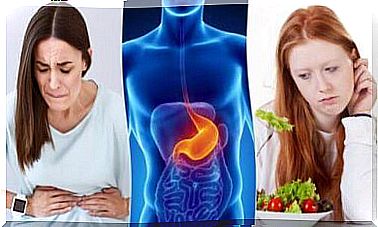What Are The Symptoms Of Gastroenteritis?

The symptoms of gastroenteritis are characterized by the inflammation that the disease causes in the gastrointestinal tract. Complaints such as diarrhoea, vomiting, abdominal pain and muscle cramps are common.
According to publications in The New England Journal of Medicine , noroviruses are the most common causes of this disease. These are RNA pathogens belonging to the Caliciviridae family. They cause about 90% of all cases of disease in adults.
So contrary to what you may think, most epidemic outbreaks of gastroenteritis are caused by viruses, not bacteria. Therefore, you need to know the symptomatology of the disease in order to understand how to effectively treat it.
The lethality of gastroenteritis
Various epidemiological studies estimate that there are between three and five billion cases of gastroenteritis each year worldwide. This is certainly a significant number.
The World Health Organization (WHO) therefore warns us that the effect is much more severe in children under the age of five. Here are some facts about this condition:
- Diarrhea diseases are the second leading cause of death in children under the age of five, translating to approximately 525,000 deaths per year.
- Studies show that at least 453,000 of these infant deaths are the result of rotavirus. It concerns 22% of deaths in countries such as Ethiopia and India.
- A significant proportion of these deaths could be prevented through access to both safe drinking water and adequate sanitation in public places.
- Worldwide, there are approximately 1.7 billion cases of diarrhea in infants each year.
As we have read, the most common viruses that cause gastroenteritis in adults are noroviruses. Children under five are more susceptible to rotavirus.
If you want to know how to distinguish between the symptoms of gastroenteritis based on the causative agents, read on.
What are the symptoms of gastroenteritis?

The answer to this question strongly depends on the causative agent. Sources such as the US National Library of Medicine emphasize that there are three main pathogenic elements:
- viruses
- bacteria
- parasites
Below we will look at what happens with each of these forms of infection and in addition we will discuss which symptoms of gastroenteritis this cause can trigger.
Viral Gastroenteritis
According to clinical studies, viral gastroenteritis (also called stomach flu) caused by the rotavirus is usually asymptomatic in adults, with an incubation period of one to three days.
If the patient does show outward symptoms, these last an average of five to seven days. The symptoms of viral gastroenteritis include:
- watery diarrhea without blood
- abdominal pain and cramps
- nausea and vomiting
- headache
- mild fever, between 37 and 38 degrees Celsius
Knowing when to see a doctor is essential because while these diseases usually do not require clinical intervention, some people may require emergency treatment.
For example, in both children and adults, the presence of blood in the vomit and stool or the inability to retain fluids for 24 hours are obvious symptoms that require immediate treatment.
Bacterial Gastroenteritis
Scientific studies confirm that the bacteria of the genus Campylobacter are the most common causes of bacterial gastroenteritis.
Half of this is due to exposure to contaminated poultry meat. Other infections that can cause the same symptoms include:
- Escherichia coli
- Salmonella
- shigella
The United States Veterans Health Library has compiled the general symptomatology of this type of infection. Some of the most common symptoms of bacterial gastroenterisis include:
- watery diarrhea
- nausea and vomiting
- fever and chills
- stomach ache
- blood in the stool, in the most severe cases
As you have read, the differences between viral and bacterial gastroenteritis are minimal, although fever and blood in the stool are more common in the latter cause.
There are a number of clear symptoms and signs that medical intervention is immediately necessary. This is required, among other things, for problems such as:
- a progressive deterioration, accompanied by a persistent increase in fever above 38 degrees Celsius.
- the presence of blood in the stool.
- signs of dehydration (dry mouth and absence of urine).
Parasitic Gastroenteritis
This is a very broad category and includes various types of parasites from protozoa to tapeworms, as well as nematodes and other flatworms. All of these parasites can cause generalized gastroenteritis in both children and adults.
Research (Spanish link) shows that the symptoms of this type of gastroenteritis are similar to the aforementioned complaints. However, new symptoms appear including:
- anorexia and weight loss
- anemia
- vitamin deficiencies
This is because in many cases (such as with a tapeworm infection) the parasite feeds directly on the contents of the intestines or the patient’s blood.
Also, these types of illnesses usually last longer than the aforementioned. For example, the tapeworm can survive in the body for two or three years if no antiparasitic treatment is given.
Non-infectious gastroenteritis

However, we should note that not all cases of gastroenteritis are due to infectious causes. Some of the conditions that can cause this common symptomatology include:
- celiac disease
- Crohn’s disease, ie inflammation of certain parts of the intestines.
- food poisoning
- Ulcerative Colitis
Your body’s warning signs that you need to see a doctor include complaints such as:
- high fever
- severe pain
- blood in the stool
- dehydration
What to watch out for in gastroenteritis
Although there are many obvious symptoms of gastroenteritis, despite the observed diversity, a medical diagnosis is necessary in all severe cases in order to provide the most effective treatment for each patient.
In general, both dehydration of the body and the presence of blood in the stool are clear warning signs that you should see a doctor urgently.
In summary, regardless of the causative agent, the symptoms of gastroenteritis always include complaints of diarrhoea, abdominal pain and nausea. However, there will always be very obvious variations depending on whether the disease is caused by bacteria, is a virus or a parasite.








